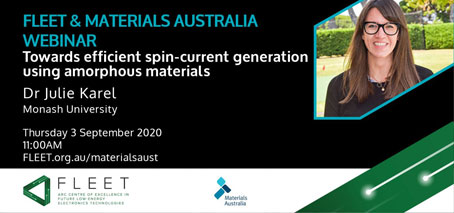 An online audience of almost 90 tuned in this week to hear FLEET CI Dr Julie Karel describing her search for non-volatile memory technologies and associated materials challenges.
An online audience of almost 90 tuned in this week to hear FLEET CI Dr Julie Karel describing her search for non-volatile memory technologies and associated materials challenges.
The talk was co-hosted by FLEET and Materials Australia.
Julie described her own work at Monash Department of Material Science and Engineering developing materials that can efficiently generate spin currents, particularly the use of low-cost, defect-tolerant amorphous materials that promise substantial spin-current generation.
Because these materials lack long-range order, they are typically not considered for such applications. However, they offer the advantages of being extremely tolerant to defects and generally lower in cost.
Julie will ultimately demonstrate the promise of these systems in generating substantial spin currents, which may be applicable for a variety of emerging non-volatile memory applications.
Dr Julie Karel conducts research at the intersection of materials science and condensed-matter physics, to develop new materials for emerging low-energy nano-electronic and magneto-electronic devices.
Electronic data is being produced at a breathtaking rate. In fact, each year more data is stored than has been written in all prior human history. With 8% of global electricity already being consumed in information and communication technology (ICT), and that energy-use doubling every decade, low-energy data-storage technologies are a key priority in advanced electronics.

